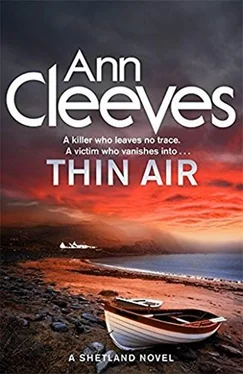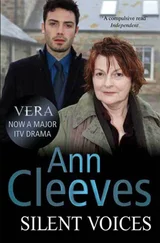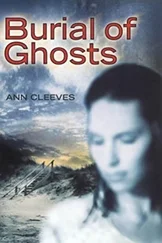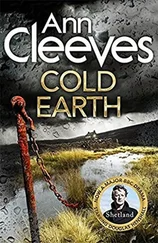‘Look at this! Hundreds of pounds for a set of bedroom curtains. You can see why the couple were running out of cash.’ She wondered if David had sanctioned the expenditure or if he’d closed his eyes to it because he knew the excitement of renovating and decorating Springfield was all that kept Charles in Shetland.
Perez had finished emptying shelves and turned his attention to a painted cupboard that formed a window seat, the only original piece of furniture in the room. It contained memorabilia of Charles’s stage career, flyers and posters, a signed programme for the Royal Variety Show , photos of Charles next to men with wide lapels and women with big hair. He piled the contents onto the floor. Then he stopped. He was on his knees and was so still for a moment that it looked to Willow as if he was praying. Then he pulled a pair of latex gloves from his jacket pocket. She got down beside him and was again aware of her body close to his. He reached inside the cupboard and pulled out a small digital recorder, held it carefully in his fingers for her to see.
‘It could be a coincidence.’ Willow stood up. ‘No reason at all why it should be Eleanor’s.’ But she didn’t believe in coincidence and she could hear the excitement in her own voice. Here they could have found a definite link between the two victims.
‘Let’s see, shall we?’ Perez stood it on the desk and switched it on. They heard an eager young woman talking about walking along the path from Voxter after an evening with her relatives and seeing the apparition of Peerie Lizzie.
‘That’s Vaila Arthur, telling Eleanor the story of her encounter with Peerie Lizzie,’ Willow said. ‘Can we go right back to the beginning and play it from the start?’
Perez pressed a couple of buttons. There was silence. Willow expected to hear Vaila’s words again. Instead there was a child’s voice. She was singing a simple melody; it was piping and a little flat on the high notes, but still moving somehow.
‘What on earth is that?’ She looked across the desk at Perez, whose face was white and quite still.
He waited a moment before answering. ‘That,’ he said, ‘is Peerie Lizzie’s song.’
Perez recognized the song after the first few bars. Cassie had learned it at school and had come home singing it, over and over, to rehearse for the end-of-term show, until he and Fran had wanted to scream. And although Fran was still alive then, still a real presence in her own house, warm and strong and argumentative, he’d thought it wrong to teach Peerie Lizzie’s song to the children. He’d understood the need for the bairns to be aware of their cultural heritage, the folk traditions, but this song had only been written twenty years ago, by Marty Thomson up in Northmavine, and it celebrated the death of a real child who had died. But when he’d voiced his concerns to Fran she’d laughed at him and told him he was being daft and he’d spent too long as a cop. ‘Kids love spooky stories. And most of them don’t even listen to the words.’
His sense of her was so real that for a moment he imagined it was Fran sitting on the other side of the desk in the big house in Unst, and not Willow Reeves.
On hearing Willow’s voice he was jolted back to the present, and felt the loss of his woman all over again. He felt he had to explain his reaction to the song, and as he did so his memory of Fran’s laughter at his anxiety – at his notion that Cassie might be frightened – melted away. He’d wanted to focus on the memory, the sound that Fran’s voice had made and the shape of her body with her head thrown back.
‘A well-known local musician wrote it. It’s a kind of ballad, using the story of Elizabeth Geldard’s death. The children learn it in school – it’s seen as part of their heritage, but the teachers also use it as a warning that the shore can be dangerous and the children have to be aware of the incoming tides.’ As he spoke he was thinking there was something different about the song on the tape. It wasn’t quite as Cassie had sung it. He considered asking Willow to play it once more, but was worried about the way he might respond. Perhaps he’d get emotional again, break down even, and he’d promised Willow that he was well now and perfectly fit for work.
‘So why is it on Eleanor’s recorder? Did Vaila Arthur sing it? More background to her story of seeing the ghost?’
‘That wasn’t a woman’s voice,’ Perez said. ‘It was a child.’ It was the one thing of which he was certain.
‘So if we find out who the singer was we might know who else Eleanor met on the day of the party. Vaila only has a baby. It couldn’t have been her.’
Perez didn’t answer.
‘We should ask Vaila,’ Willow said. ‘Come on, Jimmy. No time like the present.’
Perez felt her looking at him strangely and tried to concentrate on what she was saying, but he was thinking of the song and what was different about the recording from the version he knew. At last he got to his feet and followed her out of the house. They walked into the yard to pick up their car and found David sitting outside the walled garden, smoking.
‘I gave up years ago.’ He nodded towards the cigarettes on the bench beside him. ‘These were Charlie’s. He thought I didn’t know that he’d started smoking again. I pretended not to, because I didn’t want to nag. All these pretences and small lies. It seems ridiculous now. Why couldn’t we just be honest with each other?’ He sucked in the nicotine as if he hoped it would kill him immediately.
Vaila let them in to her smart new bungalow. She had the baby over one shoulder and was patting her back. ‘She’s been crying all morning,’ she said. ‘Wind or colic. I’m not sure I’d know the difference, though.’ And she looked at them hopefully as if they might be expert in the ways of small children.
Willow ignored her. ‘I’m sorry to disturb you, but I’ve got a few more questions.’
Vaila put the kettle on, still holding the child. ‘I’m glad to see you,’ she said. ‘My man’s working away again and we all need adult company, don’t we?’ But her voice was cheerful; there was no evidence here of post-natal depression.
‘I’ll do this.’ Perez nodded towards the cups and the teapot. ‘You go and sit down.’ He wondered what it might be like to hold a very small baby against your skin, how it might smell, and then thought again that he needed to pull himself together. With Fran gone, that was never going to happen.
In the lounge he poured the tea and offered milk and sugar as if it was his place. Willow and Vaila were already talking.
‘We’ve found Eleanor Longstaff’s digital recorder,’ Willow said.
‘You heard my piece then. What do you think it sounded like?’ She looked at them, demanding their approval.
‘Very good.’ Willow smiled. ‘Brilliant in fact.’
‘So do you think they might still use it for the telly?’
‘That’s nothing to do with us.’
Perez could tell that Willow was starting to lose patience with the young mother. Eventually she’d come out with a sarcastic comment that would alienate their witness. ‘There was something else on the recorder,’ he said gently. ‘A piece of music. Can you tell us anything about that?’
Vaila looked genuinely puzzled. ‘Eleanor didn’t play any music to me.’
‘Did she ask you about Peerie Lizzie’s song?’
‘Marty Thomson’s tune? No, nothing like that. Just about my story.’
‘We’re interested in the children who live in Meoness,’ he said. He thought she would ask why they wanted to know, but she seemed strangely incurious about anything other than the possibility of appearing on television. ‘Are there any kids aged between seven and twelve here?’
Читать дальше












